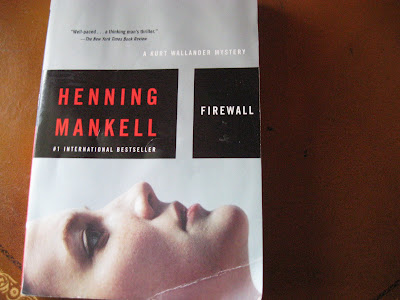Those of you interested in crime fiction have probably heard of the Swedish writer Henning Mankell and may have read his books. I recently re-read his books and promised feedback to some of my friends, so here it is:
In the books you follow Kurt Wallander, one of the most compelling and human of fictional detective inspectors, through his 40s. He gets divorced; he has many disappointments, many resolutions to change his life but is never quite able to follow through. So he goes on, like most of us, living his old habits and wondering if his life is passing him by.
The books are also masterful descriptions of police work and procedures. I like to read crime novels and police procedurals because the author has to set scenes and describe a place and time carefully. And Mankell does that so well. These books take place in Ystad, a harbor town in Skane, the southernmost province of Sweden. The land there is flat, it's windy, very windy and you can feel the wind and the chill in the stories that take place in the fall and winter.
When it rains, the fields turn to mud and there is much talk about the mud in these books. The cops seem to always be sloshing through it, with mud sticking to their boots (gumboots in the British translations). But in summer the rape fields are filled with yellow blooms that sway in the wind and you can picture them as well.
Ystad has a harbor with fishing boats and ferries that go to Poland and Wallander likes to visit the harbor to think, as he tries to solve a crime. There must also be an abundance of pizza parlors in Ystad; the cops seem to live on pizza and coffee while working a case.
As I was reading the books again, I tired to grasp what's so special about them. The first thing that comes to mind is the author's intelligence and his ability to describe detective work just as it must be in real life, with coffee, more coffee and all the aforementioned pizzas. The plots have many layers and many characters and Mankell follows through and builds the story, the people, and the suspense in a way that's very satisfying to this reader. The detectives are so human: they forget things, they lose stuff, including their tempers; they worry, they doubt, they suffer from setbacks and disappointments. After a while, the four or five detectives on Wallander's team become just as real as he is.
The crimes are gruesome at times and a changing, more violent, Sweden is frequently addressed. I don't recognize it much from the country I left so long ago. What I've described here may sound a bit gloomy, with Wallander hitting middle age and not being satisfied with all levels of his life; cops working around the clock and living on coffee and pizzas; a Sweden full of problems, crimes and disappointments. But Mankell is a great writer with a talent for character and story development. His intelligence shines through each and every book, leaving you ultimately very satisfied after you finish reading them.
Some of these novels can be seen on Masterpiece Mystery every now and then with Kenneth Branagh in the role of Wallander. I don’t know where the shows were filmed, but everything seems authentic and Swedish, from uniforms to cop cars with their blue lights flashing.
It's a good idea to read these books in order because they cover the lives of these detectives chronologically and often refer back to events that happened in an earlier book. The photos above show the books in the correct order, no matter what it says inside some covers. I'm missing the first book, Faceless Killers, and I don't remember it. My favorites are more toward the end of the list:Faceless Killers
The Dogs of Riga
The White Lioness
The Man Who Smiled
Sidetracked
The Fifth Woman
One Step Behind
Firewall
In addtion to these, there is another book: The Pyramid, that Mankell wrote after he was so successful with this series. It describes Wallander's early years, when he first decided to become a policeman; the early years of his marriage; and his relationship with his dad, the man who made his living painting the same landscape paintings over and over, one with a grouse, the other without. Wallander's eccentric dad is also sometimes featured in the above books.







